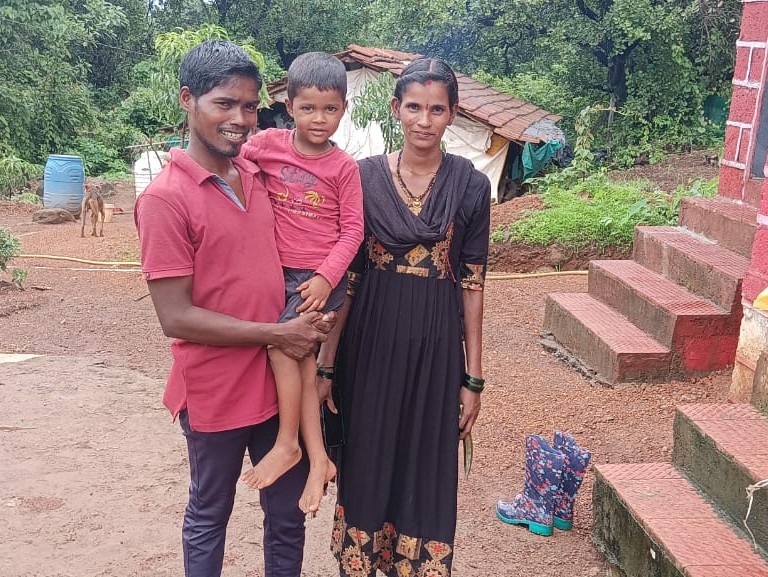We were finally hitting some sort of rhythm and routine at the farm. Kharif sowing (June to October) of rice, millets, and several climber vegetables like gourds and pumpkins. Rabi sowing (November to May) of wheat, corn, tomatoes, and loads of greens.
Routine is good. Routine is comforting. Routine is essential. And though we had our small hiccups and troubles, everything was ticking along as well as could be expected.
Then, halfway through our paddy planting (more about that in the next post), the Imp—our hardworking, every-smiling mainstay at the farm—called to say he was feeling breathless and weak. A quick call to Grim S, and the Imp was rushed to the nearest hospital at midnight. Remember, please, that the farm is in very rural Maharashtra. When I say the nearest hospital, I am speaking about 8 km downhill on the unnamed road, then another 10 km to the closest small town, and a further 12 km to the nearest government hospital that is open through the night. At midnight. With no public transport. Definitely no Uber or Ola.
The Imp was kept in the grim outpatient ward overnight, and after two bottles of saline, he was pronounced fit to discharge.

No cause for panic, then. A huge sigh of relief. A few admonishments to him to take better care of his health and to use the packets of Electral (oral rehydration salts) we always keep at the farm. We liberally distribute these to our farm workers, neighbours, and even people from neighbouring settlements to stave off mild and sometimes severe dehydration.
It was business as usual for the next few weeks until the Imp called again, complaining of severe pain in his chest and abdomen. Grim S was pressed into service yet again, and this time the doctors decided to run some tests. Grim S stood guard and sent me live videos of the Imp being rolled on a gurney into the ultrasound machine. A day later, the doctor prescribed medicine to dissolve gallstones, an antacid, a pain relief gel, paracetamol, and a course of anti-bacterial antibiotics.
The farm work limped along, but the Imp was not doing well. There was a new complaint every day. Pain, palpitations, breathlessness, fatigue, and all-around discomfort. We insisted he rest and hire labour to do his job. But a week later, he was back at the medical centre and was given medication to treat acid reflux and a different antacid and paracetamol.
This was getting very worrying. I carried back all his reports and rushed off to consult our brilliant Doc-to-the-Stars. Doc frowned, shook his head unhappily, and suggested we get the Imp to Mumbai for proper diagnosis and treatment as his reports and the symptoms I described showed a possibility of intestinal tuberculosis.
As we hit panic buttons and tried to work out the logistics of getting the Imp admitted to a Mumbai hospital, Manager M came to the rescue. He works with a large non-government organisation in the Raigad district and said the state government had a very robust and proactive approach to patients suffering from tuberculosis, and there was an almost guaranteed recovery if treated early.
So, Manager M took the Imp to the Public Health Center, and I was again bombarded with images of the Imp being wheeled in for a CT scan of the chest. An anxious day later, we got news that the CT scan was clear. In the meantime, the government doctor had given Imp the entire course of medication he should start taking if his TB test was positive. This was free and part of the government’s aim to fight and eradicate TB. We were also assured that the Health Center would send a doctor to the Imp’s house to test his wife, kids, and parents for TB. Again, this would be done at the cost and initiative of the government.

The days did not pass quietly. His wife cried copiously, his sister called and wept while detailing how her brother-in-law died of tuberculosis, and the Imp called and messaged at all hours of the day and night, terrified by the thought of him having contracted tuberculosis. It truly was a very tense time.
Then, the health officer advised the Imp to get a TB antigen gold test done. Appointment taken, test done, we waited anxiously for the report. Again, we heaved a sigh of relief when we saw the test was negative.
Having done all this, I wanted to be sure we had crossed every T and dotted every I, so it was one more consult with the Doc-to-the-Stars. He advised a further series of tests, including S-creatinine and a CT scan of the abdomen, to be absolutely certain it wasn’t abdominal tuberculosis. The poor Imp had to make multiple trips to the clinic as the test needed him to be on an empty stomach, and he’d had a full breakfast before undertaking the long trip. Again, remember the difficulty of getting from the farm to anywhere at all. A few anxious days later, we got the CT report, and it showed no abnormality. A huge sigh of relief. No tuberculosis, for sure. Of any sort! But there was no diagnosis either. Bad diet? Malnutrition? Something else? We’ve done every test possible and still don’t know what ails our Imp.
Doc-to-the-Stars advised no spicy food, reduce oil, increase protein, and include fruit and vegetables in his diet for a month and then report. So, the Imp is now eating two eggs and an apple every day, and his wife has promised to cut the spice and oil in their food.
It’s been over a month now, and there hasn’t been any panic. Keeping fingers crossed, it stays that way.
But through all this, I was very impressed with the state government’s rural healthcare. The doctor was knowledgeable and kind. He had dealt with hundreds of patients with tuberculosis and knew exactly what to look for. If the Imp had tested positive for TB, he and his entire family would have been treated without having to pay a penny.
I’m rarely pleasantly surprised by our government, local or national; this is one such time.
Now, if they ever manage to fix the Hell Highway, NH66, I’ll be a happy bunny.


